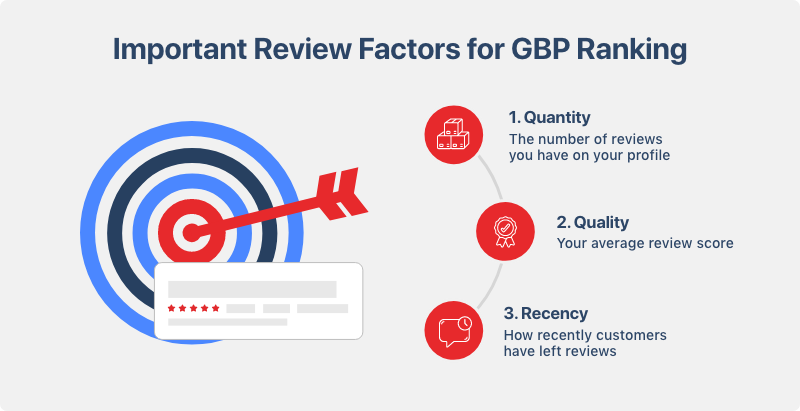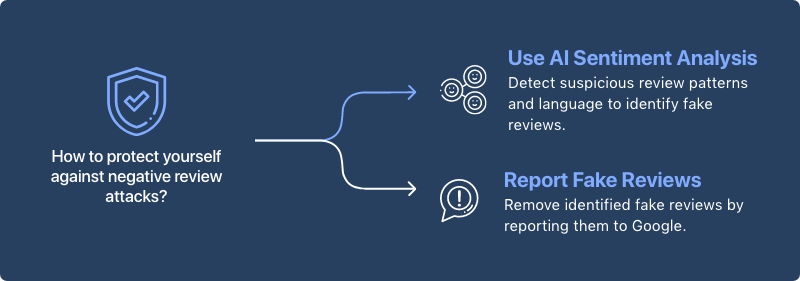What people say about your business on Google can make or break your online visibility, not to mention your performance on the ground.
Simply put, having a strong reputation on Google directly impacts your local search performance and how many customers call, book an appointment with, or visit your business.
That's where Google reputation management comes in. It makes all the difference between getting found and chosen over your competitors in local search results or getting buried beneath them and overlooked.
What Is Google Reputation Management?
Google reputation management is the process of actively managing your reviews on Google. It involves collecting, responding to, and analyzing sentiment from reviews on your company's Google Business Profile (GBP) listing(s). It can also involve combating negative SEO attacks on your GBP (competitors leaving fake negative reviews).

Why Google Review Reputation Management Matters
Any local business's most important digital asset for improving online visibility is its GBP.
Nine times out of ten, when someone searches for nearby products or services, they're doing so via one of Google's services, whether that's the browser-based Search or the Maps app. When someone does this, Google shows them a list of local businesses that potentially meet their needs.
On Google Search, these results appear in what's known as the Google 3-pack or the local pack, a box of Google Maps-based results that appear above traditional organic (blue-link) search results.
In order to determine which Google Business Profiles to show users for their searches, Google looks at several important ranking factors related to relevance, proximity, and prominence.
Google reputation management matters because of the third ranking factor we just mentioned: prominence.
A business's prominence is essentially how well-known and reputable it is and, in the eyes of Google, GBP reviews are the ultimate source of truth about a business's reputation.
So, in a nutshell, having more positive Google reviews helps your business appear higher up in local search results, which is why it's so important to actively manage your online reputation on Google.
How To Do Reputation Management for Google Reviews To Improve Rankings
When Google looks at your business's GBP reviews to decide where to rank it in local search results, it breaks them down into the following sub-factors, or signals:
- Quantity
- Quality
- Recency
- Velocity
Quantity is exactly what you might expect: the number of reviews you have on your profile. While there's no magic number of reviews you need to rank on Google, more tends to be better, but the following two signals also play a big role.
The quality of the reviews, or your average review score, is hugely important to Google as well. For example, you could have 1000 reviews, but if your average review score is 2.3, Google isn't going to rank your business very well. It's better to have a smaller number of reviews with high ratings.
The recency of your reviews matters, too. Google tends to rank businesses with a consistent influx of recent reviews better than those with outdated reviews.
Lastly, velocity is the pace at which you receive reviews. Google favors businesses with a steady flow of reviews, rather than those that get a bunch of reviews at once, then nothing for a long time, which can be a sign of inorganic Google reputation management.

Increasing Review Quantity for Google Reputation Management
Increasing a business's number of Google reviews is one of the easier parts of doing Google review reputation management. It's often simply a matter of implementing policies and procedures to encourage customers to leave a review after being served by your business.
For instance, a contractor could send out thank-you emails or text messages after completing a job to ask customers to leave a review on their GBP. Or, a restaurant could incentivize its servers to ask customers for reviews after finishing a meal by giving them a bonus for any review mentioning them by name.
Even just posting a QR code linking to your Google reviews somewhere in your business, such as at the cash register or on dining tables, can help encourage customers to leave reviews, increasing your review quantity over time.
Improving Review Quality To Manage Online Reputation on Google
Improving the quality of your Google reviews is a bit trickier than increasing the quantity, as it's directly tied to service. If there are any issues with your services, you're inevitably going to get a negative review every now and then, especially since disgruntled customers are much more likely to leave reviews than happy ones.
However, there's a magic tool that can help you improve your reviews over time: sentiment analysis.
Sentiment analysis is the process of scraping your past reviews for data and drawing insights from them that can help you improve your services, ultimately leading to more positive reviews in the future.
Using the right sentiment analysis tool, such as Local Falcon's AI-powered Reviews Analysis tool, you can comb over all your Google reviews at once to generate a report that highlights the bad and the good and provides actionable suggestions for how to boost review quality, whether it's for one location or many.
For example, a Reviews Analysis Report might mention that a business's bad reviews frequently mention a specific employee, and suggest providing them with training to improve their performance.
You can even take your Google review analysis a step further by using these reports with Falcon Agent, Local Falcon's built-in agentic AI, to generate even more comprehensive recommendations for improving your business's performance and reviews.
Maintaining Review Recency for Reputation Management on Google
Many businesses make the mistake of letting their Google reputation management fall to the side after reaching a certain number of reviews and high average rating on Google. But doing this can cause your rankings to plateau or even fall below competitors who are still collecting a steady stream of reviews on their GBP listings.
No matter how many reviews you have or what your average review score is, it's important to keep practices in place to continue gathering them, as well as keep performing sentiment analysis at regular intervals to ensure business performance and ratings remain high.
Managing Google Review Velocity
In order to avoid raising suspicions about your reputation management tactics, aim to get reviews at a relatively steady pace. Of course, some seasonal or other type of fluctuation can occur, but the more consistent your pace of reviews is, the better. Even getting just one new good review a week is better than getting five in a day and then none for the next three months.
So, let's say you're going to send out emails to a bunch of past customers asking them for reviews, it's better to send out the requests in batches over a set period of time, rather than sending them all at once.
For example, if you have 500 past customers who you want to ask for reviews, you might send out 50 emails a week for 10 weeks instead of sending out all 500 emails right away. That way, you're more likely to get three or four reviews a week spread out over several months, resulting in a "good" review velocity in the eyes of Google.
A Word on Responding To Reviews for Google Reputation Management
Responding to reviews, both bad and good, is another important aspect of managing your reputation on Google. Responding to all reviews shows customers that you value their feedback and are engaged with your profile.
If new customers know that you read and respond to reviews, they are more likely to leave one themselves, increasing your review quantity and helping maintain recency.
Not only that, but responding professionally to negative feedback and addressing customer issues appropriately can even get a customer to remove their negative review or turn it into a good one, improving your review quality!
What About Preventing Negative Review Attacks as Part of Google Reputation Management?
As we touched on earlier, managing your reputation on Google isn't just about constantly collecting good reviews from real satisfied customers. It also involves watching out for negative review attacks on your profile.
Unfortunately, there are malicious competitors and shady SEO practitioners out there who will sometimes pay people to leave fake bad reviews on your GBP listing, artificially deflating your rankings and inflating their own performance.
Luckily, just as you can use AI-powered sentiment analysis to improve your reviews, you can also use it to spot suspicious review patterns and language that could indicate a competitor leaving fake negative reviews on your profile.
Then, once you've identified potentially fake reviews, you can report them to Google to get them removed.

The Bottom Line
Google reputation management is a critical component of any local SEO strategy. Your Google Business Profile reviews directly influence how visible your business is on Google, how potential customers perceive your brand, and how you stack up against competitors in the local pack.
Take control of your online reputation on Google by consistently increasing the quantity, quality, and recency of your reviews, using tools like sentiment analysis to guide your improvements and boost your rankings. Don't forget to respond to reviews professionally and monitor your profile for fake reviews as well!
Managing your reputation on Google isn't a one-time task, but rather an ongoing process that, when done right, can drive consistent, tangible results for your business.

